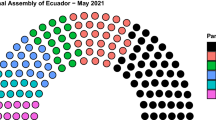Abstract
This paper presents some new results about majority games. Isbell (1959) was the first to find a majority game without a minimum normalized integer representation; he needed 12 voters to construct such a game. Since then, it has been an open problem to find the minimum number of voters of a majority game without a minimum normalized integer representation. Our main new results are:
1. All majority games with less than 9 voters have a minimum integer representation.
2. For 9 voters, there are 14 majority games without a minimum integer representation, but all these games admit a minimum normalized integer representation.
3. For 10 voters, there exist majority games with neither a minimum integer representation nor a minimum normalized integer representation.
This research was partially supported by Grant MTM 2006–06064 of “Ministerio de Ciencia y Tecnología y el Fondo Europeo de Desarrollo Regional” and SGRC 2005-00651 of “Generalitat de Catalunya”, and by the Spanish “Ministerio de Ciencia y Tecnología” programme TIN2005-05446 (ALINEX).
Preview
Unable to display preview. Download preview PDF.
Similar content being viewed by others
References
Carreras, F., Freixas, J.: Complete simple games. Mathematical Social Sciences 32, 139–155 (1996)
Dubey, P., Shapley, L.S.: Mathematical properties of the Banzhaf power index. Mathematics of Operations Research 4(2), 99–131 (1979)
Freixas, J.: Structure of simple games. PhD thesis, Technical University of Catalonia, Manresa (Barcelona), Spain, (October 1994) (In Spanish)
Freixas, J.: The dimension for the European Union Council under the Nice rules. European Journal of Operational Research 156(2), 415–419 (2004)
Freixas, J., Molinero, X.: On the existence of a minimum integer representation for weighted voting systems. Annals of Operations Research, (submitted, October 2006)
Freixas, J., Zwicker, W.S.: Weighted voting, abstention, and multiple levels of approval. Social Choice and Welfare 21, 399–431 (2003)
Isbell, J.R.: A class of simple games. Duke. Mathematics Journal 25, 423–439 (1958)
Isbell, J.R.: On the enumeration of majority games. Mathematical Tables and Other Aids. to Computation 13(65), 21–28 (1959)
Maschler, M., Peleg, B.: A characterization, existence proof, and dimension bounds for the kernel of a game. Pacific Journal of Mathematics 18, 289–328 (1966)
Muroga, S.: Threshold logic and its applications. Wiley-Interscience, New York, USA (1971)
Muroga, S., Toda, I., Kondo, M.: Majority decision functions of up to six variables. Mathematics of Computation 16(80), 459–472 (1962)
Muroga, S., Toda, I., Takasu, S.: Theory of majority decision elements. J. Franklin Inst. 271(5), 376–418 (1961)
Muroga, S., Tsuboi, T., Baugh, C.R.: Enumeration of threshold funcitons of eight variables. IEEE Trans. Computers 19(9), 818–825 (1970)
Von Neumann, J., Morgenstern, O.: Theory of Games and Economic Behavior. Princeton University Press, Princeton, New Jersey, USA (1944)
Taylor, A.D.: Mathematics and Politics. Springer, New York, USA (1995)
Taylor, A.D., Zwicker, W.S.: Simple games: desirability relations, trading, and pseudoweightings. Princeton University Press, New Jersey, USA (1999)
Author information
Authors and Affiliations
Editor information
Editors and Affiliations
Rights and permissions
Copyright information
© 2007 Springer-Verlag Berlin Heidelberg
About this paper
Cite this paper
Freixas, J., Molinero, X., Roura, S. (2007). Minimal Representations for Majority Games. In: Cooper, S.B., Löwe, B., Sorbi, A. (eds) Computation and Logic in the Real World. CiE 2007. Lecture Notes in Computer Science, vol 4497. Springer, Berlin, Heidelberg. https://doi.org/10.1007/978-3-540-73001-9_31
Download citation
DOI: https://doi.org/10.1007/978-3-540-73001-9_31
Publisher Name: Springer, Berlin, Heidelberg
Print ISBN: 978-3-540-73000-2
Online ISBN: 978-3-540-73001-9
eBook Packages: Computer ScienceComputer Science (R0)




